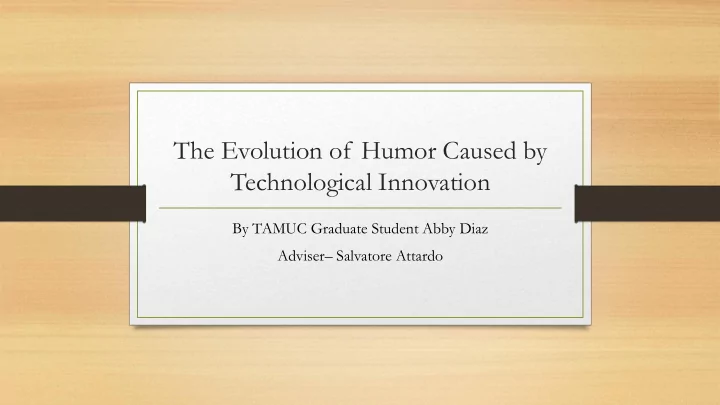

The Evolution of Humor Caused by Technological Innovation By TAMUC Graduate Student Abby Diaz Adviser – Salvatore Attardo
Jokes vs. Memes – Word Count • In this study, the average word count was found of 100 jokes randomly chosen from the book The Penguin Book of Australian Jokes ; the same was done with 100 memes taken from two websites: • http://www.srune.com/lists/top-100-funny-memes/154/ • https://www.complex.com/pop-culture/2012/06/the-100-greatest-internet-memes-of- all-time/the-most-interesting-man-in-the-world
Jokes vs. Memes – Word Count
Jokes vs. Memes – Word Count Average word count for the 100 jokes – 60.79 Average word count for the 100 memes – 9.79
A Picture is Worth a 1000 Words • In their paper on jokes as a text type, Attardo and Chabanne (1992) explain how humorous points can be created by the interaction of visuals and text. • Some visuals are independently humorous, such as the picture on the right.
A Picture is Worth a 1000 Words • In other cases, the visual requires the accompaniment of humorous text. • Take, for example, the Far Side cartoon to the left. If the text were removed, the cartoon would no longer be humorous (strange, perhaps, but now humorous). In cases like this, the visual serves as an introduction to the situation.
A Picture is Worth a 1000 Words The opposite can occur as well. Humor can be created by a normal caption that is accompanied with an incongruent visual.
A Picture is Worth a 1000 Words • In her book, The Language of Jokes in the Digital Age , Delia Chiaro (2018) claims that we have shifted from slow humor to fast humor, saying that we live in a fast moving, online world that quickly grows tired of yesterday’s news. • I propose that this is related to the finding that memes tend to be strikingly shorter than more traditional jokes. With an abundance of sources of humor at one’s finger tips, it is plausible that the current generation does not want to spend much time on any one source.
Instant Gratification With less or nothing at all to read (or hear), is this type of humor simply a result of a fast- paced environment that is geared toward instant gratification? (An environment that has been largely created by the internet) Has the modern mind been trained to expect things instantly, and with minimal effort? If so, does it stand to reason that the current generation simply does not want to wait or put forth effort for more than a few seconds to enjoy their humor? Or is it that humans have typically always preferred visuals over text when it comes to humor, and that the current technology is simply enabling a manifestation of this preference?
A Return to a Pre-literate Culture? According to an article published by the University of Texas at Arlington (2015), there was a 10% drop in the U.S. literacy rate between the years 1982 and 2002. They go on to say that many researchers cite the rapid increase of other types of entertainment media as the cause (in addition to educators failing to encourage students to develop a daily habit of reading.)
A Return to a Pre-literate Culture? With phenomena such as the joke/meme word count ratio of about 6 to 1 found in this study; a decrease in literacy rates due partially to advances in technology; and inventions such as Siri and Alexis that are verbally activated, is it reasonable to speculate that our current technological innovation is generating, at least in part, a return to a pre-literate, visual culture in regards to both humor and the culture as a whole?
Or Progress to a Tertiary Orality? • According to Turner and Allen (2013) we may be on the verge of a “tertiary orality” (an interdependence with technology.) • They point out that our secondary orality (literacy) brought about major changes such as the Industrial Revolution. • If we do reach a tertiary orality, what changes might it bring to our daily lives? Will the language of humor be completely different than it was just 30 years ago?
References • Attardo, S., & Chabanne, J. C. (1992). Jokes as a text type: Humor-International Journal of Humor Research , 5-1/2, 165-176. • Chiaro, D. (2018). The language of jokes in the digital age . New York, NY: Routledge. • Turner, D., & Allen, W. (2013). Documents, dialogue, and the emergence of tertiary orality. Proceedings of the Eighth International Conference on Conceptions of Library and Information Science, Copenhagen, Denmark. • University of Texas at Arlington. (2015). A brief history of literacy. Retrieved from https://academicpartnerships.uta.edu/articles/education/brief-history-of- literacy.aspx
Recommend
More recommend